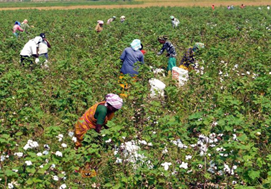

23rd December 2022 (8 Topics)
Context
The cotton farmers in several States have urged the Centre and demanded an increase in the minimum support price (MSP) of the crop.
About
About the MSP for cotton:
- The domestic prices right now are higher than the MSP of cotton.
- The MSP for medium staple cotton for the 2022-23 Kharif seasons is Rs 6,080.
- Though farmers said they got prices much higher than MSP for their produce, it was inadequate given the rise in the price of input items such as seeds, pesticides and fertilisers.
What is MSP?
- It is the minimum price at which government agencies procure particular crops from the farmer at MSP.
- It is announced by the government on 23 commodities including 22 mandated crops and fair and remunerative price (FRP) for sugarcane.
Who announced MSP?
- The Cabinet Committee of Economic Affairs announces MSP based on the recommendations of the Commission for Agricultural Costs and Prices (CACP).
- The CACP takes into account demand and supply, the cost of production and price trends in the market among other things when fixing MSPs.
- The price is announced at the beginning of the sowing season.
Why is MSP important?
- Though prices of agro commodities may soar while in short supply, during years of bumper production, prices of the very same commodities plummet.
- MSPs ensure that farmers get a minimum price for their produce in adverse markets.
- MSPs have also been used as a tool by the Government to incentivize farmers to grow crops that are in short supply.
Challenges Associated with MSP:
- Policy issue: Farmers across the country have been facing problems with selling their produce at the minimum support price.
- Procedural delay: Problems like delays in the setting up of procurement centres, and exploitation by commission agents defeat the purpose of MSP.
- Involvement of Middlemen: Taking advantage of the complexities in the supply chain, middlemen appear to be causing disparities in the price.
Cotton farming patterns:
- It is a Kharif Crop that comes from the natural fibres of cotton plants, which are native to tropical and subtropical regions.
- The top five cotton-producing countries are China, India, the United States of America, Brazil and Pakistan, which together account for more than three-quarters of global production.
- Being renewable and biodegradable, cotton is the most environmentally friendly raw material for the textile industry as compared to its synthetic alternatives.
- Cotton plants have a large growing period which can extend up to 200 days. Growing cotton starts between December and March.
- These plants require a relatively high temperature (21-30°C) over a long growing season.
- Cotton is a less water-intensive crop as it is a xerophyte, which can grow in dry, arid environments.
Cotton production in India:
- India is the largest producer of cotton in the world and the third largest exporter. It is also the largest consumer of cotton in the world.
- Top Cotton Producing States in India are Gujarat and Maharashtra. Telangana, Andhra Pradesh.
- India is the country to grow all four species of cultivated cotton;
- G. arboreum and
- Herbaceum (Asian cotton),
- G. barbadense (Egyptian cotton) and
- G. hirsutum (American Upland cotton).
- hirsutum represents 94% of the hybrid cotton production in India and all the current Bt cotton hybrids are G. hirsutum.
- Now India’s Cotton would be known as ‘Kasturi Ctton’in the world cotton Trade.
- The pest-resistant Genetically Modified (GM) Bt cotton hybrids have captured the Indian market (covering over 95% of the area under cotton) since their introduction in 2002.
- These now cover over 95% of the area under cotton, with the seeds produced entirely by the private sector.
- India is the only country that grows cotton as hybrids and the first to develop hybrid cotton back in 1970.
More Articles


